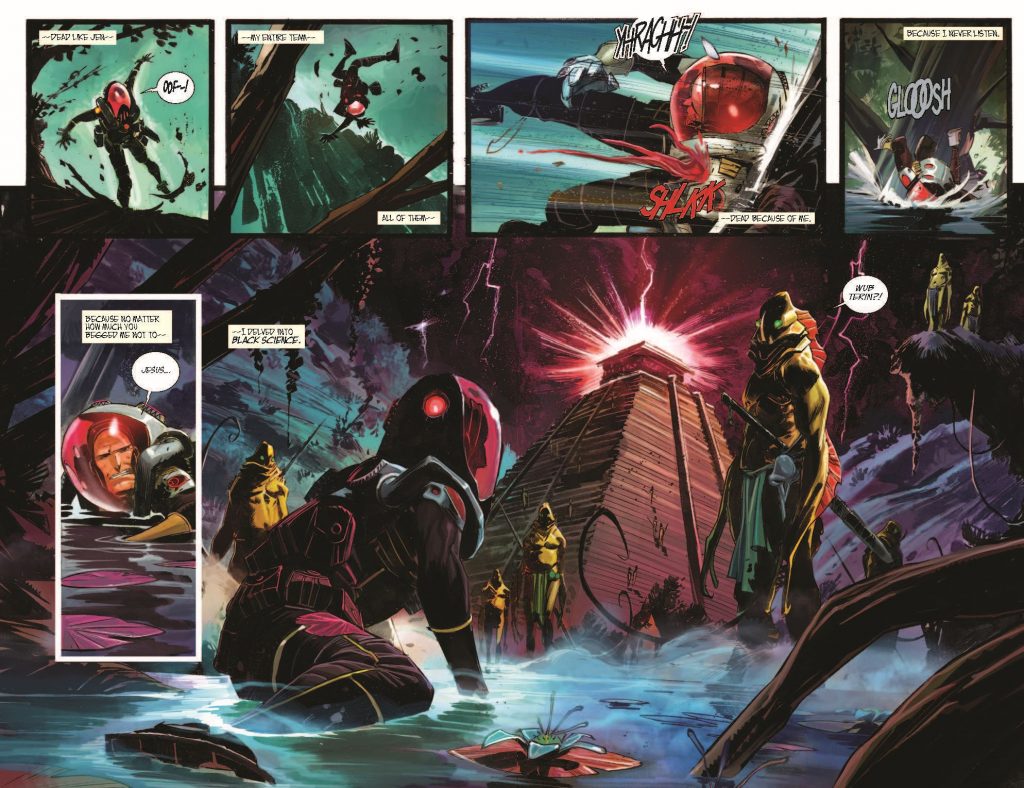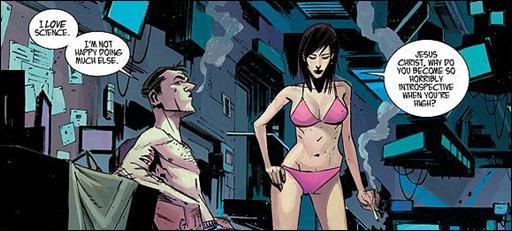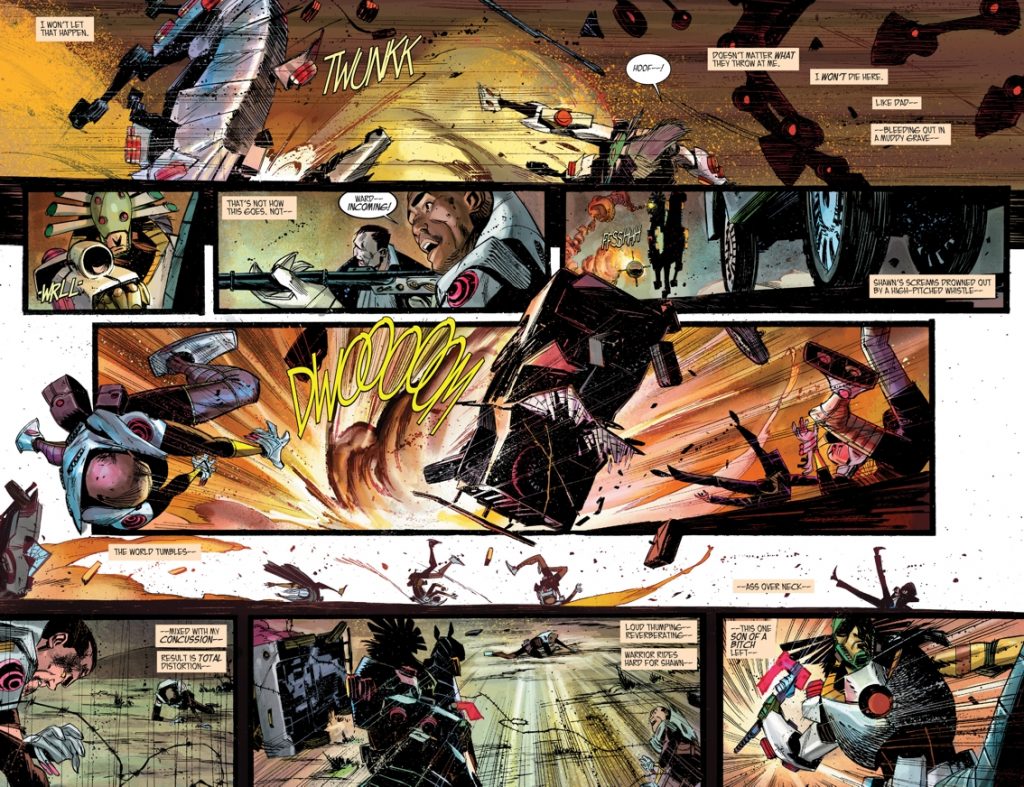Graphic Reviews: Black Science
As I’ve mentioned a few times before, science fiction is largely hit or miss for me. The genre is capable of imagining incredible (and compellingly believable) futures whose trajectory from the present is very clear to see. Just think of all the great science fiction in the eighties and nineties that has led to where we are today. The trouble for me is that I struggle to understand a lot of the science in hard science fiction. Anytime that the fiction becomes intricately invovled with mathematics and science, my brain decides to take a little nap. It’s even worse if time travel is involved. Add enough alternate dimensions or time jumps and I’ll be so confused that I won’t even be able to tell you which dimension/time I’m currently in. The vast majority of time travel related science fiction is an exercise in frustration for me. Enter Rick Remender and Matteo Scalera’s series, Black Science. This is a series that has been recommended to me numerous times but that I’ve always avoided because a) I hated Rick Remender’s Deadly Class series and wondered if I wouldn’t hate this one too and b) was pretty sure I’d hate this one too because the story revolves directly around alternate dimensions/time travel. But after fellow Aeither writer Kyle recommended the series and I had the chance to hear the artist Matteo Scalera talk about creating covers for the series at Denver Comic Con last month, I finally decided to give it a shot. Black Science is a story about a scientist named Grant McKay who is essentially not a nice person ( a vast understatement) and how his experiments with a dimension traveling device lead to his family and his team being lost amongst the dimensions of the Eververse. It’s up to Grant, his children and his team to find their way back home again before the consequences of their meddling catch up to them. It’s an intense ride full of dark, often terrible people and creatures and an examination of the ways in which humans screw each other over. It’s dark but it’s also emotionally compelling and much more than I expected when I picked up a time traveling science fiction story. For the purposes of this review, I’ll be talking about issues 1-21 which is where the most recent volume left off. The series is an ongoing one so if it intrigues you, be sure to check out Image Comics for more information on the release dates for future issues. The series is written by Rick Remender, illustrated by Matteo Scalera and colored by Dean White.

Seems like a spoiler, but I promise it’s not. This series really hits the ground running (alternate dimensions, remember?)
Black Science opens with the leader of the Anarchist Scientist League, Grant McKay, showing his latest work off to his children, Pia and Nathan. From the beginning, it’s clear that Grant is a pretty terrible husband/father figure. Grant’s project, the Pillar, has taken over his life and as a result, he has been more absent than present in Nate and Pia’s lives. This Pillar is a device that opens up many possible alternate dimensions known collectively as the Eververse which can be used to find any number of advanced technologies, cures for diseases and, more ominously, vast amounts of power. Grant and his team of fellow scientists have been working for a decade on the project and have finally created a working Pillar. Full of pride, Grant shows off the Pillar to his children but something goes horribly wrong and the Pillar transports Grant, his children and the entire team to one of the many alternate dimensions in the Eververse. Stuck with a malfunctioning Pillar, surrounded by people who both love and hate him, Grant and his team must find a way to get everyone home before the dangers of the Eververse make that impossible.
There are a lot of time traveling stories out there so I honestly think readers can be forgiven for wondering what makes Black Science so special. I mean, why bother reading this one when there’s a billion other similar concepts? For me, the appeal of Black Science came down to its inherent darkness. Grant McKay is, frankly, a total asshole. He not only hasn’t been present in his children’s lives, he’s been a terrible husband and father. His cynicism towards the world and authority figures in particular has made him harsh towards any attachments that he sees as weighing him down. And the others on the team are each terrible in their own ways. There’s Kadir, the corporate kiss ass who will do literally anything to survive and somehow rationalize it all away; Rebecca, Grant’s partner and secret lover, who has little care for the havoc she has helped to create within the McKay family; Shawn, the young scientist and mentee of Grant McKay who isn’t quite as peaceful and understanding as he seems and others. What’s delightful about Black Science is how very human all of the characters are. They’re selfish, irresponsible and despite their intelligence, don’t always fully understand the consequences of their actions. Grant McKay might be leading them but he isn’t the solitary bad guy here. In fact, it’s hard to find very many true good guys and that’s honestly pretty refreshing. The interactions between the characters felt realistically dark and self-serving but also had shining moments where “nobility” would appear, sometimes for selfish reasons and sometimes not. I also really liked that Black Science wasn’t one of those time/dimension traveling stories where the characters just jump from place to place with no real regard for what they’re leaving behind. There are very serious consequences to the jumps and the characters screw up a lot. It made for a very intense story that felt as dark and compelling as a story about alternate realities and both the opportunities and extreme dangers that they represented.
The work of Matteo Scalera and Dean White deserves a special mention as well because it’s outstanding. Scalera’s alien landscapes and creatures are imaginative and fascinating, making it extremely difficult to look away from the page. While Scalera has a somewhat odd tendency to draw the faces of the characters with exaggerated smiles and grimaces, this is a minor fault in otherwise gorgeous landscapes and environments. The action is well drawn, never confusing despite nerve wracking tension or violent battles. And Dean White’s coloring is a perfect match for worlds which are as vibrant as the ones depicted by Remender and Scalera. I was honestly as impressed by the art as I was by the writing and I was plenty impressed by both.
Even if you’re as much of a hard science fiction hater as myself, Black Science is absolutely a must-read. I suppose that I would add the caveat that if you want really light, happy, rose colored glasses kind of stories, this may not be your thing. Black Science isn’t unrelenting grimdarkness but it deals a lot with the darker side of humanity and what gets people to do the right thing, even if it’s for the wrong reasons. It’s as much character study as it is a science fiction adventure (though it is equally wonderful as both) and I found it to be one of the most compelling stories that I’ve read in a very long time. I would highly recommend the series to anyone who enjoys science fiction and nuanced, intriguing characters.
-Cait



Pingback: Graphic Reviews: Tokyo Ghost – Aeither.net